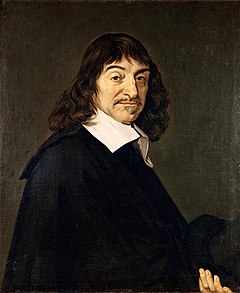ရနေး ဒေးကာ့: တည်းဖြတ်မှု မူကွဲများ
Content deleted Content added
အရေးမကြီး stub done |
အရေးမကြီး link text fixed |
||
| စာကြောင်း ၁၈ - | စာကြောင်း ၁၈ - | ||
| influences = [[ပလေတို]]၊ [[အရစ္စတိုတယ်]], [[:en:Ibn al-Haytham|အယ်ဟာဇမ် (Alhazen)]]၊ [[:en:Al-Ghazali|အယ်ဂါဇာလီ (Al-Ghazali)]]၊<ref>{{cite book |last=Marenbon |first=John |title=Medieval Philosophy: an historical and philosophical introduction |page=174 |publisher=[[Routledge]] |year=2007 |url=http://www.routledge.com/books/details/9780415281133 |isbn= 978-0-415-28113-3}}</ref> [[:en:Averroes|အာဗဲရို့ (Averroes)]], [[:en:Avicenna|အာဘီစန်းနား (Avicenna)]]၊ [[:en:Anselm of Canterbury|အန်ဆမ်း (Anselm)]]၊ [[စိန့်ဩဂတ်စတင်း|ဩဂတ်စတင်း (Augustine)]]၊ [[:en:Thomas Aquinas|အကွိုင်းနပ် (Aquinas)]]၊ [[:en:William of Ockham|အော့ကမ် (Ockham)]], [[:en:Francisco Suárez|ဆွာရေ (Suarez)]]၊ [[:en:Marin Mersenne|မာဆန် (Mersenne)]]၊ [[:en:Sextus Empiricus|ဆက်တပ် အမ်ပီရစ်ကတ် (Sextus Empiricus)]]၊ [[မွန်တေနျူ|မွန်တေနျူ (Montaigne)]]၊ [[:en:Jacobus Golius|ဂိုးလီယပ် (Golius)]]၊ [[:en:Isaac Beeckman|ဘေ့ခမန် (Beeckman)]]၊ [[:en:Duns Scotus|ဒန်း စကိုးတပ် (Duns Scotus)]]<ref>[[Étienne Gilson]] argued in ''La Liberté chez Descartes et la Théologie'' (Alcan, 1913, pp. 132–47) that Duns Scotus was not the source of Descartes' [[Voluntarism (theology)|Voluntarism]]. Although there exist doctrinal differences between Descartes and Scotus "it is still possible to view Descartes as borrowing from a Scotist Voluntarist tradition" (see: John Schuster, [http://books.google.gr/books?id=WPGb_P4mP8AC&dq= ''Descartes-Agonistes: Physcio-mathematics, Method & Corpuscular-Mechanism 1618–33''], Springer, 2012, p. 363, fn. 26).</ref> |
| influences = [[ပလေတို]]၊ [[အရစ္စတိုတယ်]], [[:en:Ibn al-Haytham|အယ်ဟာဇမ် (Alhazen)]]၊ [[:en:Al-Ghazali|အယ်ဂါဇာလီ (Al-Ghazali)]]၊<ref>{{cite book |last=Marenbon |first=John |title=Medieval Philosophy: an historical and philosophical introduction |page=174 |publisher=[[Routledge]] |year=2007 |url=http://www.routledge.com/books/details/9780415281133 |isbn= 978-0-415-28113-3}}</ref> [[:en:Averroes|အာဗဲရို့ (Averroes)]], [[:en:Avicenna|အာဘီစန်းနား (Avicenna)]]၊ [[:en:Anselm of Canterbury|အန်ဆမ်း (Anselm)]]၊ [[စိန့်ဩဂတ်စတင်း|ဩဂတ်စတင်း (Augustine)]]၊ [[:en:Thomas Aquinas|အကွိုင်းနပ် (Aquinas)]]၊ [[:en:William of Ockham|အော့ကမ် (Ockham)]], [[:en:Francisco Suárez|ဆွာရေ (Suarez)]]၊ [[:en:Marin Mersenne|မာဆန် (Mersenne)]]၊ [[:en:Sextus Empiricus|ဆက်တပ် အမ်ပီရစ်ကတ် (Sextus Empiricus)]]၊ [[မွန်တေနျူ|မွန်တေနျူ (Montaigne)]]၊ [[:en:Jacobus Golius|ဂိုးလီယပ် (Golius)]]၊ [[:en:Isaac Beeckman|ဘေ့ခမန် (Beeckman)]]၊ [[:en:Duns Scotus|ဒန်း စကိုးတပ် (Duns Scotus)]]<ref>[[Étienne Gilson]] argued in ''La Liberté chez Descartes et la Théologie'' (Alcan, 1913, pp. 132–47) that Duns Scotus was not the source of Descartes' [[Voluntarism (theology)|Voluntarism]]. Although there exist doctrinal differences between Descartes and Scotus "it is still possible to view Descartes as borrowing from a Scotist Voluntarist tradition" (see: John Schuster, [http://books.google.gr/books?id=WPGb_P4mP8AC&dq= ''Descartes-Agonistes: Physcio-mathematics, Method & Corpuscular-Mechanism 1618–33''], Springer, 2012, p. 363, fn. 26).</ref> |
||
| influenced = [[ဆပင်နိုဇာ ဘီ|ဆပင်နိုဇာ (Spinoza)]]၊ [[:en:Leibniz|လိုက်ဘနစ် (Leibniz)]]၊ [[:en:John Locke|ဂျွန် လော့ခ် (John)]]၊ [[:en:Nicolas Malebranche|မဲဘရန့် (Malebranche)]]၊ [[:en:Blaise Pascal|ဘလေ့ဇ် ပါစကဲ (Blaise Pascal)]]၊ [[:en:Edmund Husserl|အက်ဒမန် ဟက်စရယ် (Edmund Husserl)]]၊ [[:en:Noam Chomsky|နုမ်း ချွမ်စကီ (Noam Chomsky)]]၊ [[နယူတန်|အိုက်ဇက် နယူတန် (Issac Newton)]]၊ [[:en:Slavoj Žižek|စလဗော့ ရေရက် (Slavoj Žižek)]]၊ [[:en:Fichte|ယိုဟန် ဂေါ့လိ ဖစ်ရှတ (Johann Gottlieb Fichte)]] |
| influenced = [[ဆပင်နိုဇာ ဘီ|ဆပင်နိုဇာ (Spinoza)]]၊ [[:en:Leibniz|လိုက်ဘနစ် (Leibniz)]]၊ [[:en:John Locke|ဂျွန် လော့ခ် (John)]]၊ [[:en:Nicolas Malebranche|မဲဘရန့် (Malebranche)]]၊ [[:en:Blaise Pascal|ဘလေ့ဇ် ပါစကဲ (Blaise Pascal)]]၊ [[:en:Edmund Husserl|အက်ဒမန် ဟက်စရယ် (Edmund Husserl)]]၊ [[:en:Noam Chomsky|နုမ်း ချွမ်စကီ (Noam Chomsky)]]၊ [[နယူတန်|အိုက်ဇက် နယူတန် (Issac Newton)]]၊ [[:en:Slavoj Žižek|စလဗော့ ရေရက် (Slavoj Žižek)]]၊ [[:en:Fichte|ယိုဟန် ဂေါ့လိ ဖစ်ရှတ (Johann Gottlieb Fichte)]] |
||
| notable_ideas = ''[[:en:Cogito ergo sum|Cogito ergo sum]]'' {{efn|ဒေးကာ့၏ ဤအဆိုကို မြန်မာလို "ငါတွေး၍ ငါရှိသည်" ("I think, therefore I am") ဟု အကြမ်းဖျဉ်း ဘာသာပြန်နိုင်သော်လည်း မူရင်းသုံး လက်တင်ဘာသာဖြင့် ညွှန်းဆိုခြင်းမှာ ပိုမိုတွင်ကျယ်၍ ဤအဆို၏ အမည်ကို လက်တင်ဘာသာဖြင့်သာ ထားရှိခြင်းက ပိုမိုသင့်လျော်နိုင်သည်။ (ဤအဆိုကို ဒေးကာ့က ပြင်သစ်နှင့် လက်တင်နှစ်ဘာသာသုံး၍ ရေးခဲ့သည်။)}}၊ [[:en:Methodic Doubt|စနစ်တကျ သံသယ (methodic doubt)]]၊ [[:en:method of normals|ထောင့်မှန်ကျလိုင်းများ ရှာနည်း (method of normals)]]၊ [[:en:Cartesian coordinate system|ကာတေးရှန်း ကိုဩဒိနိတ်စနစ် (Cartesian coordinate system)]]၊ [[:en:Cartesian dualism|ကာတေးရှန်း ရုပ်နာမ်နှစ်ဖြာဝါဒ (Cartesian dualism)]]၊ ဘုရား (God) ရှိကြောင်း [[:en:ontological argument|ဖြစ်တည်မှုဆိုင်ရာ အဆို (ontological argument)]]၊ ''[[:en:mathesis universalis]]'' {{efn|မြန်မာလို "ပြီးပြည့်စုံသည့် အသိပညာဘာသာစကား" ဟု အကြမ်းဖျဉ်း ဘာသာပြန်နိုင်သော်လည်း ဤ mathesis universalis ဆိုသည်မှာ ဂရိနှင့် လက်တင်ပေါင်းစပ်ထားသည့် (လူအမည်၊ နေရာအမည်ကဲ့သို့) ပုဂ္ဂလနာမ်နီးပါးဖြစ်ရာ မူရင်းအတိုင်း ထားရှိခြင်းက မိုပိုသင့်လျော်နိုင်သည်။}}၊ [[:en:folium of Descartes|ဒေးကာ့၏ ပန်းထုံး (folium of Descartes)]] |
| notable_ideas = ''[[:en:Cogito ergo sum|Cogito ergo sum]]'' {{efn|ဒေးကာ့၏ ဤအဆိုကို မြန်မာလို "ငါတွေး၍ ငါရှိသည်" ("I think, therefore I am") ဟု အကြမ်းဖျဉ်း ဘာသာပြန်နိုင်သော်လည်း မူရင်းသုံး လက်တင်ဘာသာဖြင့် ညွှန်းဆိုခြင်းမှာ ပိုမိုတွင်ကျယ်၍ ဤအဆို၏ အမည်ကို လက်တင်ဘာသာဖြင့်သာ ထားရှိခြင်းက ပိုမိုသင့်လျော်နိုင်သည်။ (ဤအဆိုကို ဒေးကာ့က ပြင်သစ်နှင့် လက်တင်နှစ်ဘာသာသုံး၍ ရေးခဲ့သည်။)}}၊ [[:en:Methodic Doubt|စနစ်တကျ သံသယ (methodic doubt)]]၊ [[:en:method of normals|ထောင့်မှန်ကျလိုင်းများ ရှာနည်း (method of normals)]]၊ [[:en:Cartesian coordinate system|ကာတေးရှန်း ကိုဩဒိနိတ်စနစ် (Cartesian coordinate system)]]၊ [[:en:Cartesian dualism|ကာတေးရှန်း ရုပ်နာမ်နှစ်ဖြာဝါဒ (Cartesian dualism)]]၊ ဘုရား (God) ရှိကြောင်း [[:en:ontological argument|ဖြစ်တည်မှုဆိုင်ရာ အဆို (ontological argument)]]၊ ''[[:en:mathesis universalis|mathesis universalis]]'' {{efn|မြန်မာလို "ပြီးပြည့်စုံသည့် အသိပညာဘာသာစကား" ဟု အကြမ်းဖျဉ်း ဘာသာပြန်နိုင်သော်လည်း ဤ mathesis universalis ဆိုသည်မှာ ဂရိနှင့် လက်တင်ပေါင်းစပ်ထားသည့် (လူအမည်၊ နေရာအမည်ကဲ့သို့) ပုဂ္ဂလနာမ်နီးပါးဖြစ်ရာ မူရင်းအတိုင်း ထားရှိခြင်းက မိုပိုသင့်လျော်နိုင်သည်။}}၊ [[:en:folium of Descartes|ဒေးကာ့၏ ပန်းထုံး (folium of Descartes)]] |
||
| signature = Firma Descartes.svg |
| signature = Firma Descartes.svg |
||
}} |
}} |
||
၁၃:၅၇၊ ၂၈ ဇန်နဝါရီ ၂၀၁၅ ရက်နေ့က မူ
ဤဆောင်းပါးကို အင်္ဂလိပ် ဝီကီပီးဒီးယား ရှိ René Descartes အား တစ်စိတ်တစ်ပိုင်းဖြစ်စေ၊ အလုံးစုံဖြစ်စေ မှီငြမ်း၍ မြန်မာဘာသာသို့ ပြန်ဆိုရန် လိုအပ်နေသေးသည်။
|
ရနေး ဒေးကာ့ (အင်္ဂလိပ်: René Descartes /ˈdeɪˌkɑːrt/၊[၄] ပြင်သစ်: [ʁəne dekaʁt]၊ မတ် ၃၁၊ ၁၅၉၆ - ဖေဖော်ဝါရီ ၁၁၊ ၁၆၅၀) သည် ပြင်သစ်လူမျိုး အတွေးအခေါ် နှင့် သင်္ချာပညာရှင် တစ်ဦးဖြစ်သည်။
မှတ်စု
- ↑ ဒေးကာ့၏ ဤအဆိုကို မြန်မာလို "ငါတွေး၍ ငါရှိသည်" ("I think, therefore I am") ဟု အကြမ်းဖျဉ်း ဘာသာပြန်နိုင်သော်လည်း မူရင်းသုံး လက်တင်ဘာသာဖြင့် ညွှန်းဆိုခြင်းမှာ ပိုမိုတွင်ကျယ်၍ ဤအဆို၏ အမည်ကို လက်တင်ဘာသာဖြင့်သာ ထားရှိခြင်းက ပိုမိုသင့်လျော်နိုင်သည်။ (ဤအဆိုကို ဒေးကာ့က ပြင်သစ်နှင့် လက်တင်နှစ်ဘာသာသုံး၍ ရေးခဲ့သည်။)
- ↑ မြန်မာလို "ပြီးပြည့်စုံသည့် အသိပညာဘာသာစကား" ဟု အကြမ်းဖျဉ်း ဘာသာပြန်နိုင်သော်လည်း ဤ mathesis universalis ဆိုသည်မှာ ဂရိနှင့် လက်တင်ပေါင်းစပ်ထားသည့် (လူအမည်၊ နေရာအမည်ကဲ့သို့) ပုဂ္ဂလနာမ်နီးပါးဖြစ်ရာ မူရင်းအတိုင်း ထားရှိခြင်းက မိုပိုသင့်လျော်နိုင်သည်။
အညွှန်း
- ↑ Russell Shorto (2008)။ Descartes' Bones။ Doubleday။ see also The Louvre, Atlas Database
- ↑ Marenbon၊ John (2007)။ Medieval Philosophy: an historical and philosophical introduction။ Routledge။ p. 174။ ISBN 978-0-415-28113-3။
- ↑ Étienne Gilson argued in La Liberté chez Descartes et la Théologie (Alcan, 1913, pp. 132–47) that Duns Scotus was not the source of Descartes' Voluntarism. Although there exist doctrinal differences between Descartes and Scotus "it is still possible to view Descartes as borrowing from a Scotist Voluntarist tradition" (see: John Schuster, Descartes-Agonistes: Physcio-mathematics, Method & Corpuscular-Mechanism 1618–33, Springer, 2012, p. 363, fn. 26).
- ↑ "Descartes" entry in Collins English Dictionary, HarperCollins Publishers, 1998.
| ဤ သင်္ချာပညာရှင်တစ်ဦးအကြောင်း ဆောင်းပါးမှာ ဆောင်းပါးတိုတစ်ပုဒ် ဖြစ်သည်။ ဖြည့်စွက်ရေးသားခြင်းဖြင့် မြန်မာဝီကီပီးဒီးယားကို ကူညီပါ။ |

